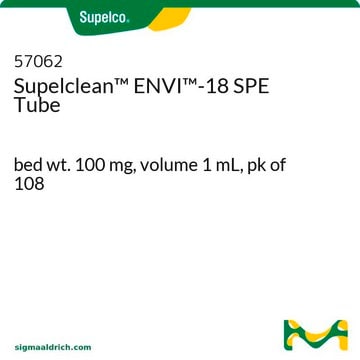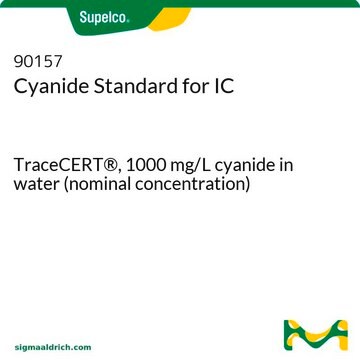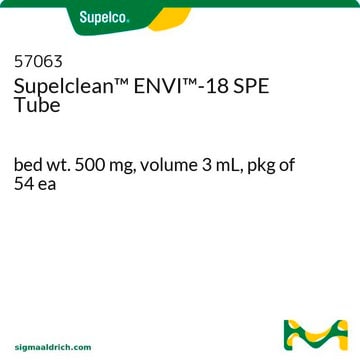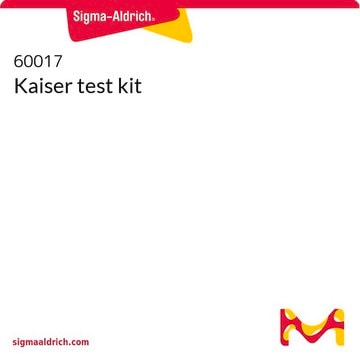60178
Potassium cyanide
BioUltra, ≥98.0% (AT)
Synonyme(s) :
KCN, Potassium salt of hydrocyanic acid
About This Item
Produits recommandés
Source biologique
synthetic
Niveau de qualité
Gamme de produits
BioUltra
Pureté
≥98.0% (AT)
Forme
crystalline
Impuretés
insoluble matter, passes filter test
pH
11.0-13.0 (25 °C, 1 M in H2O)
Pf
634 °C (lit.)
Solubilité
H2O: 1 M at 20 °C, clear, colorless
Traces d'anions
chloride (Cl-): ≤200 mg/kg
sulfate (SO42-): ≤400 mg/kg
sulfide (S2-): ≤5 mg/kg
thiocyanate (SCN-): ≤100 mg/kg
Traces de cations
Al: ≤5 mg/kg
As: ≤0.1 mg/kg
Ba: ≤5 mg/kg
Bi: ≤5 mg/kg
Ca: ≤50 mg/kg
Cd: ≤5 mg/kg
Co: ≤5 mg/kg
Cr: ≤5 mg/kg
Cu: ≤5 mg/kg
Fe: ≤100 mg/kg
Li: ≤5 mg/kg
Mg: ≤5 mg/kg
Mn: ≤5 mg/kg
Mo: ≤5 mg/kg
Na: ≤5000 mg/kg
Ni: ≤5 mg/kg
Pb: ≤5 mg/kg
Sr: ≤5 mg/kg
Zn: ≤5 mg/kg
λ
1 M in H2O
Absorption UV
λ: 260 nm Amax: 0.06
λ: 280 nm Amax: 0.03
Chaîne SMILES
[K]C#N
InChI
1S/CN.K/c1-2;
Clé InChI
YUZRZFQHUCKACF-UHFFFAOYSA-N
Vous recherchez des produits similaires ? Visite Guide de comparaison des produits
Application
Autres remarques
Mention d'avertissement
Danger
Mentions de danger
Conseils de prudence
Classification des risques
Acute Tox. 1 Oral - Acute Tox. 2 Dermal - Acute Tox. 2 Inhalation - Aquatic Acute 1 - Aquatic Chronic 1 - Met. Corr. 1 - STOT RE 1
Organes cibles
Thyroid
Risques supp
Code de la classe de stockage
6.1A - Combustible acute toxic Cat. 1 and 2 / very toxic hazardous materials
Classe de danger pour l'eau (WGK)
WGK 3
Point d'éclair (°F)
Not applicable
Point d'éclair (°C)
Not applicable
Équipement de protection individuelle
Eyeshields, Faceshields, Gloves, type P3 (EN 143) respirator cartridges
Certificats d'analyse (COA)
Recherchez un Certificats d'analyse (COA) en saisissant le numéro de lot du produit. Les numéros de lot figurent sur l'étiquette du produit après les mots "Lot" ou "Batch".
Déjà en possession de ce produit ?
Retrouvez la documentation relative aux produits que vous avez récemment achetés dans la Bibliothèque de documents.
Les clients ont également consulté
Notre équipe de scientifiques dispose d'une expérience dans tous les secteurs de la recherche, notamment en sciences de la vie, science des matériaux, synthèse chimique, chromatographie, analyse et dans de nombreux autres domaines..
Contacter notre Service technique


![Cyanide standard solution traceable to SRM from NIST K₂[Zn(CN)₄] in H₂O 1000 mg/l CN Certipur®](/deepweb/assets/sigmaaldrich/product/images/920/032/af45eec3-100b-4996-8eb3-c3942d441bc9/640/af45eec3-100b-4996-8eb3-c3942d441bc9.jpg)












